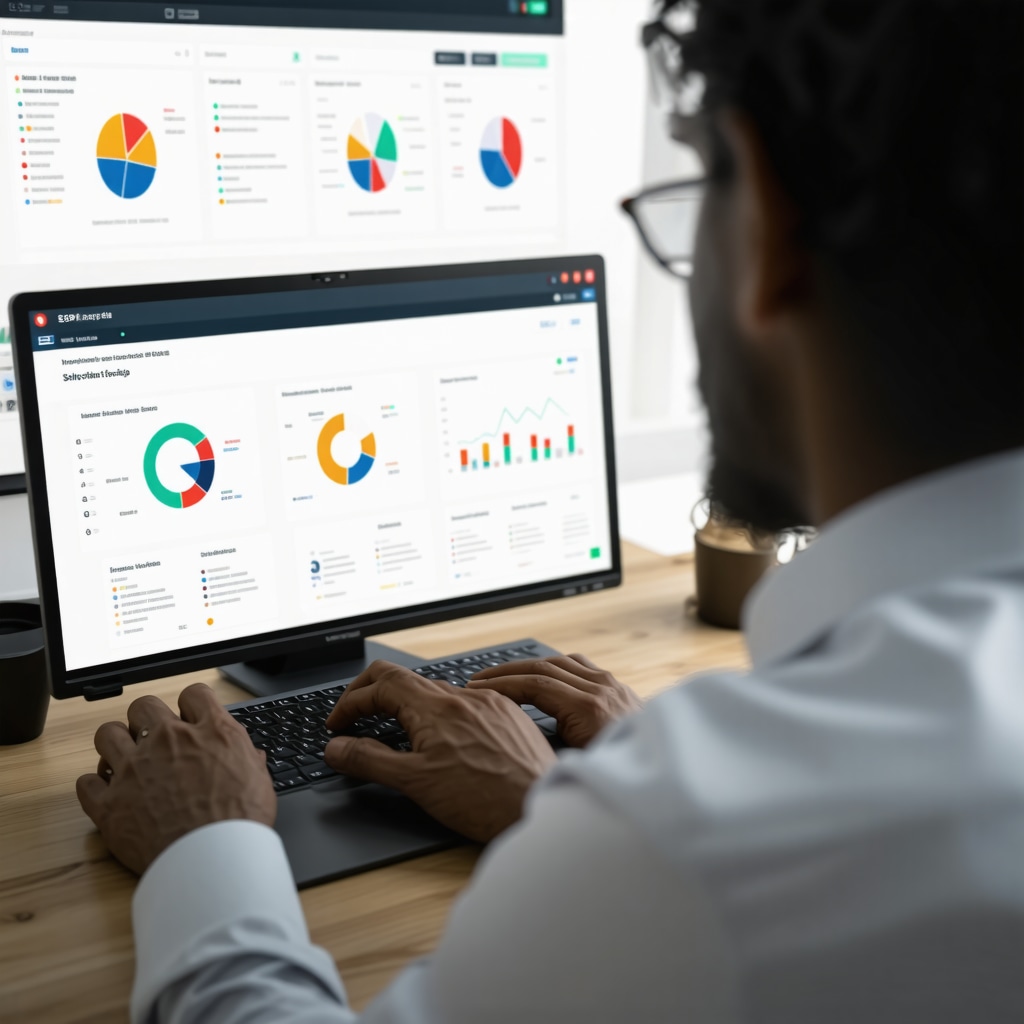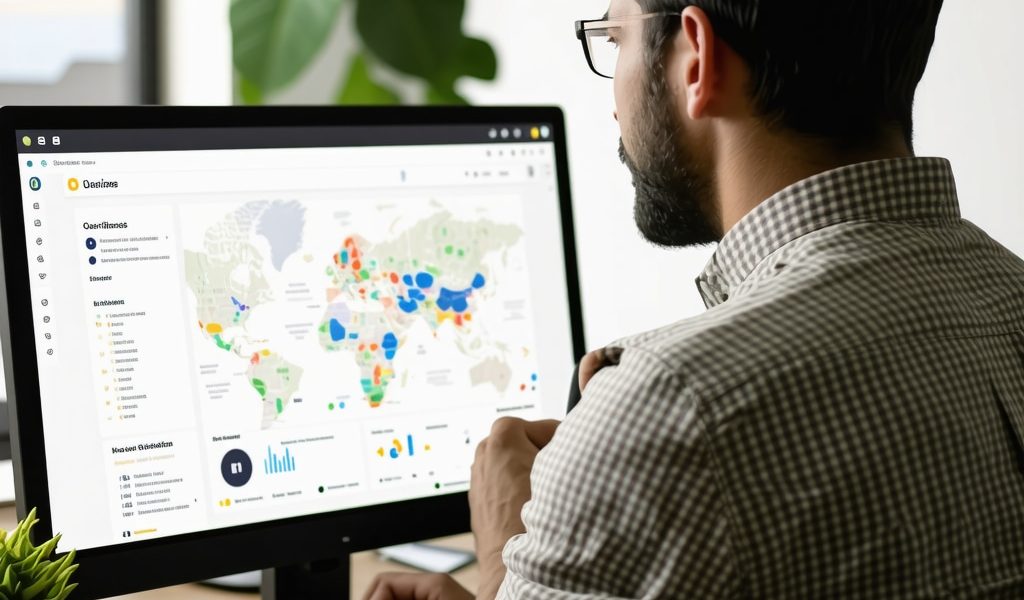Unlocking the Full Potential of GMB Citations for Local SEO Domination
In the fiercely competitive landscape of local search, managing Google My Business (GMB) citations effectively has evolved from a basic listing practice to a sophisticated strategic imperative. As experts in local SEO, we recognize that citation management is not merely about consistency but about leveraging data precision, authoritative placements, and dynamic updates to influence local pack rankings profoundly.
Why Citations Are the Cornerstone of Local Search Authority
GMB citations serve as digital endorsements that validate your business information across the web. They are integral to establishing local relevance and trustworthiness, which search engines interpret as signals for ranking. Recent studies, such as those highlighted in Moz’s local SEO guide, confirm that high-quality citations correlate strongly with improved visibility in local packs. However, the challenge lies in managing these citations at scale without sacrificing accuracy or relevance.
How to Use Data-Driven Citation Strategies for Competitive Edge
Advanced citation management involves deploying data analytics to identify authoritative sources and optimize citation placement. This includes auditing existing citations, identifying inconsistent data points, and prioritizing high-authority directories. Tools like BrightLocal and Whitespark facilitate this process, enabling marketers to track citation health and correct discrepancies that could undermine local SEO efforts. Furthermore, integrating structured data markup enhances citation credibility and search engine understanding.
What Are the Hidden Influences of Citation Consistency and NAP Accuracy?
Consistent Name, Address, Phone Number (NAP) information across all citations is foundational. Yet, emerging research reveals that semantic variations and contextual relevance of citations also impact rankings. For example, citations embedded within industry-specific directories or local community hubs carry more weight in signaling relevance. This nuanced understanding underscores the importance of a layered citation profile tailored to your niche and geographic focus.
How to Navigate the Debates on Citation Quantity Versus Quality?
While some experts advocate for aggressive citation building, others emphasize quality over quantity. Evidence suggests that a curated set of high-authority citations tailored to your local market yields better results than mass submissions to low-value directories. Moreover, recent white papers from Google’s Search Central emphasize that citation quality influences how algorithms interpret local relevance, especially in hyperlocal markets.
What Are Effective Tactics for Managing GMB Citations in a Rapidly Evolving Search Environment?
Effective citation management requires a proactive, adaptable approach. Regular audits, real-time data updates, and strategic citation acquisition in niche-specific directories are essential. Additionally, engaging with local community websites, industry associations, and citation aggregators can help sustain visibility. For comprehensive tactics, explore our detailed guide on step-by-step local citation strategies.
For those seeking to elevate their local SEO game further, continuous learning and collaboration with industry experts are vital. Consider consulting with specialized GMB citation services to stay ahead of algorithm updates and citation best practices. To contribute your insights or learn from peers, visit our contact page.
As the landscape evolves, staying informed about authoritative sources like Google’s official guidelines on local SEO ensures that your citation management aligns with the latest standards and best practices.
Elevating Your GMB Citation Strategy with Industry Insights
As local search algorithms grow more sophisticated, the importance of nuanced citation management becomes undeniable. Experts emphasize that a strategic approach involves not just listing your business, but ensuring each citation enhances your local relevance and authority. Consider integrating structured data markup—such as Schema.org—into your citations to improve search engine understanding and indexing. According to Moz’s recent analysis, structured data can significantly influence local pack rankings, especially when combined with high-quality citations from authoritative sources. For a comprehensive understanding of optimizing your citation schema, visit our local SEO techniques guide.
Challenging Assumptions: Is Quantity or Quality More Critical in 2025?
Many believe that increasing citation volume directly correlates with higher rankings; however, emerging data suggests that quality trumps quantity. In hyperlocal markets, a handful of well-maintained, authoritative citations can outperform dozens of low-value listings. Recent updates from Google’s Search Central underline that relevance and authority are key signals for local ranking algorithms. This shift underscores the importance of continuous citation auditing and prioritization of niche-specific directories that resonate with your industry and geographic focus. For practical tips, explore our advanced Google Maps SEO techniques.
How Can You Leverage Data Analytics to Fine-Tune Your Citation Portfolio?
Utilizing analytics tools to monitor citation health, consistency, and impact is crucial in a competitive landscape. Platforms like BrightLocal and Whitespark offer dashboards that track citation performance metrics, enabling marketers to identify gaps and opportunities swiftly. Regular audits using these tools reveal discrepancies in NAP data across key citations, which can be rectified to prevent ranking dilution. Moreover, integrating citation impact data with local ranking reports allows for smarter decision-making—focused on high-impact directories and industry-specific hubs. For an in-depth look at citation performance tracking, see our GMB SEO audit guide.
If you’re eager to explore cutting-edge citation strategies and tools to stay ahead, consider consulting industry-leading services like our GMB citation expertise. And don’t forget—regularly updating your citation data and leveraging local community networks can dramatically enhance your local search visibility.
To deepen your understanding, stay informed with Google’s official local SEO guidelines, which continuously evolve to reflect best practices in citation management and local ranking signals.
Harnessing Semantic Relevance to Elevate Citation Impact
While traditional citation strategies emphasize NAP consistency, emerging research underscores the significance of semantic relevance. Search engines like Google increasingly utilize semantic algorithms, such as BERT, to interpret the context of citations. This means that citations embedded within highly relevant industry-specific directories or community hubs can wield more influence than generic listings. For instance, a local bakery’s citation on a culinary arts association website signals industry relevance, thereby boosting local pack rankings.
To capitalize on this, SEO professionals should perform contextual analysis of citation sources, ensuring they align with the core industry and local community themes. Implementing schema markup with industry-specific tags can further enhance semantic understanding, creating a layered signal that search engines interpret as authoritative and relevant.
How does semantic relevance outperform mere NAP consistency in local SEO?
Semantic relevance influences search engine algorithms by providing contextual signals that affirm a business’s industry and geographic niche. Unlike NAP consistency, which primarily ensures data accuracy across platforms, semantic relevance embeds your brand within the local ecosystem, making your presence more authoritative. According to a 2024 study by Search Engine Journal, citations that incorporate industry-relevant keywords and contextual information contribute to higher trust signals, which are increasingly prioritized in local ranking factors.
Therefore, integrating semantic relevance into your citation strategy involves curating directories and community platforms that resonate with your niche, and enriching citations with schema markup and industry-specific keywords. This layered approach ensures your citations not only verify your business details but also reinforce your industry authority and local relevance, ultimately leading to superior local pack positioning and organic visibility.
Integrating Structured Data for Citation Amplification
Structured data markup, especially Schema.org, is a game-changer in citation management. Properly implemented, it allows search engines to parse detailed business information, such as services offered, customer reviews, and operational hours, directly from your citations. This enriched data enhances your business’s appearance in rich snippets and local packs, providing a competitive edge.
For example, adding LocalBusiness schema to your citations across authoritative directories ensures consistent, machine-readable data that boosts your local relevance signals. Moreover, leveraging JSON-LD formats facilitates easier integration and updates, keeping your citations dynamically aligned with your current business details.
Adopting structured data isn’t just about compliance; it’s about strategic amplification. When combined with high-quality citations, structured data significantly improves your visibility, click-through rates, and ultimately, conversions. For a comprehensive guide to schema implementation tailored for local SEO, explore Google’s official documentation.
Leveraging Data Analytics for Dynamic Citation Optimization
Advanced data analytics are indispensable for refining your citation portfolio in real-time. Platforms like BrightLocal, Whitespark, and SEMrush provide granular insights into citation performance, highlighting inconsistencies, gaps, and opportunities for strategic enhancement. Regularly auditing your citations ensures data accuracy, which is critical for maintaining local relevance and trustworthiness.
Beyond basic auditing, integrating local ranking data with citation impact metrics allows you to identify which citations most influence your visibility. For instance, if citations from a particular industry hub correlate with improved rankings, prioritizing further engagement with similar sources becomes a data-driven decision. Conversely, low-impact citations can be deprioritized or corrected to prevent dilution of your local relevance signals.
To harness this potential, develop a systematic approach to data analysis, combining citation health reports with local ranking fluctuations. This proactive methodology ensures your citation strategy adapts swiftly to algorithm updates and local market changes, maintaining your competitive edge.
For detailed tactics, consider exploring our comprehensive guide on citation analytics. Remember, continuous monitoring and strategic adjustment are vital for sustained local SEO success.
Harnessing Semantic Relevance to Maximize Citation Impact in Niche Markets
As search engines evolve, the emphasis on semantic relevance grows, compelling local SEO strategists to refine citation profiles beyond mere NAP consistency. Embedding industry-specific keywords and contextual signals within citations enhances semantic understanding, thereby elevating local pack rankings. For example, a legal practice should prioritize citations on reputable legal directories and community forums, enriched with schema markup tailored for law firms, to reinforce industry authority and relevance.
How Can Structured Data Markup Amplify Citation Effectiveness?
Implementing structured data, particularly JSON-LD schemas, transforms static citations into dynamic, machine-readable data points. This facilitates richer search result displays, such as star ratings, operational hours, and service details, which attract higher click-through rates and bolster local visibility. Regularly updating schema annotations ensures alignment with current business operations, further enhancing search engine trust and ranking signals.

What Role Does Citation Data Analytics Play in Strategic Refinement?
Leveraging advanced analytics platforms enables marketers to monitor citation health, identify inconsistencies, and assess impact on local rankings. Integrating insights from tools like SEMrush and Moz Local allows for data-driven decisions—prioritizing high-impact directories and rectifying discrepancies that could undermine authority. Continuous analysis fosters an adaptive approach, vital for maintaining an edge amid shifting algorithms and competitive landscapes.
In What Ways Can Industry-Specific Directories Be Curated for Maximum Relevance?
Curating citation sources within niche-specific directories ensures relevance and authority, which search engines highly reward. This involves identifying authoritative industry associations, local chambers of commerce, and specialized forums, then securing consistent, schema-optimized listings. Such targeted citation building not only enhances trustworthiness but also integrates your business into community and industry ecosystems, reinforcing local relevance.
Why Is Citation Diversity Crucial for Robust Local SEO?
A diversified citation portfolio, spanning general directories, industry-specific platforms, and local community websites, creates a resilient backlink ecosystem. This diversity signals search engines that your business has widespread local recognition and authority. Additionally, it mitigates risks associated with over-reliance on a handful of sources, ensuring sustained visibility even if certain directories experience algorithmic penalties or declines in traffic.
How Do Algorithm Updates Influence Citation Management Best Practices?
Staying abreast of algorithm updates from Google and other search engines is essential for adapting citation strategies. Recent updates emphasize semantic relevance, authoritative sourcing, and data accuracy. Implementing proactive audits, refining schema markup, and emphasizing high-quality, industry-relevant citations align your practices with evolving standards, preventing potential ranking penalties and ensuring continued visibility.
What Is the Future of Citation Optimization in the Age of AI and Machine Learning?
Emerging technologies like AI-driven content analysis and machine learning will increasingly influence citation strategies by enabling hyper-targeted, context-aware placements. These tools can analyze local trends, semantic signals, and user intent to recommend optimal citation sources and schema configurations. Embracing these innovations will be pivotal for future-proofing your local SEO efforts, transforming citation management into a predictive, intelligent process.
How Can SEO Professionals Integrate Cutting-Edge Tools for Citation Precision?
Utilizing AI-powered analytics platforms, structured data validation tools, and automation scripts can streamline citation audits, ensure schema compliance, and predict emerging citation opportunities. Combining these tools with expert knowledge facilitates a comprehensive, adaptive approach, positioning your business at the forefront of local SEO innovation. For practical implementation, consult resources like Moz’s advanced local SEO guides and industry webinars.
To deepen your mastery of citation optimization in a competitive landscape, regularly engage with authoritative sources such as Google’s official local SEO guidelines. Embracing continuous learning and innovation will ensure your strategies remain effective amid rapid algorithm evolution.
Expert Insights & Advanced Considerations
Semantic Relevance Trumps Quantity in Niche Markets
In 2025, leveraging semantic relevance within citations is crucial. Embedding industry-specific keywords and contextual signals enhances search engine understanding, elevating local pack rankings and ensuring your business is recognized as an authority within your niche.
Structured Data as a Power Tool for Amplification
Implementing schema markup like JSON-LD transforms static citations into dynamic, machine-readable data points. This strategy not only improves rich snippet visibility but also reinforces your business’s relevance and trustworthiness, leading to higher click-through rates and better rankings.
Data Analytics for Precision Optimization
Utilize advanced analytics platforms such as Moz Local or BrightLocal to monitor citation health, identify inconsistencies, and track their impact on local rankings. Data-driven adjustments ensure your citation portfolio remains optimized amid evolving algorithms.
Industry-Specific Directory Curation
Target authoritative, niche-specific directories and community hubs. Securing high-quality, schema-optimized listings within relevant industry ecosystems enhances credibility and relevance, which search engines highly prioritize in local SEO.
Algorithm Update Adaptation
Stay informed on the latest Google algorithm updates focusing on semantic signals, authority, and data accuracy. Regular audits and schema enhancements aligned with these changes safeguard your local rankings and prevent penalties.
Curated Expert Resources
- Moz Local: Offers comprehensive tools for citation consistency and impact analysis, essential for maintaining authoritative profiles.
- BrightLocal: Provides deep insights into citation health, local rankings, and review management, enabling precise optimization.
- Schema.org: The definitive resource for implementing structured data markup to enhance search visibility.
- Google’s Official Local SEO Guidelines: The authoritative source for staying updated on best practices and algorithm changes.
- Search Engine Journal: Features in-depth articles on semantic SEO, schema implementation, and the future of local search algorithms.
Final Expert Perspective
In the rapidly evolving landscape of local SEO, mastering advanced GMB citation strategies—focused on semantic relevance, structured data, and data analytics—can decisively influence your business’s visibility and authority. Embracing these sophisticated tactics ensures your local SEO efforts are resilient, future-proof, and positioned for sustained success. Engage with industry experts, leverage cutting-edge tools, and continually refine your approach to stay ahead in 2025 and beyond. For deeper insights, explore our detailed comprehensive local SEO techniques guide and connect with seasoned professionals to elevate your local search dominance.





This article really hits home for me, especially the emphasis on semantic relevance and structured data. I’ve seen firsthand how businesses that focus solely on NAP accuracy often miss out on the added boost that schema markup and industry-specific citations can provide. Incorporating schema.org markup has notably improved our local pack rankings, particularly in hyperlocal markets. It’s fascinating how Google’s AI and semantic algorithms are evolving; ensuring your citations are contextually relevant seems to be the way forward.
What strategies have others found effective for identifying high-authority, industry-specific directories that also support schema markup integration? I’m curious if tools like BrightLocal or Whitespark facilitate this kind of targeted sourcing or if manual research is still the most reliable method. I believe continuous learning in this space is essential given how rapidly local SEO standards are changing. Would love to hear some success stories or tips from others trying to stay ahead of these updates.